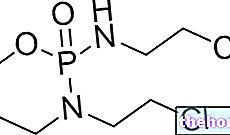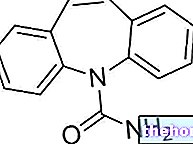hyperphosphorylated tau.
progressive, cognitive impairment (memory loss);
Acetylcholinesterase inhibitors
Acetylcholinesterase inhibitors increase the amount of acetylcholine in the synaptic space: overcoming the blood-brain barrier, they reach the central neural system exercising their therapeutic activity.
These drugs are used in the treatment of mild to moderate Alzheimer's disease to improve cognitive (decreased memory and attention) and behavioral (agitation, apathy, hallucinations) symptoms. Among the active ingredients belonging to this group, we find:
- The donepezil;
- The rivastigmine;
- Galantamine.
Memantine
Memantine is indicated for the treatment of patients with moderate to severe Alzheimer's disease. It works by non-competitively antagonizing the NMDA receptors for glutamate, one of the most important excitatory neurotransmitters in our central nervous system. In doing so, memantine modulates pathologically elevated tonic levels of glutamate which can lead to neuronal dysfunction. In fact, there is evidence according to which the malfunction of glutamatergic neurotransmission - and, in particular, that mediated by NMDA receptors - can contribute both to the manifestation of the symptoms of Alzheimer's syndrome and to the advancement of neurodegenerative dementia.
Antipsychotics
For the treatment of aggression and psychotic symptoms that could occur in patients with Alzheimer's, the doctor may decide to intervene with the administration of antipsychotics, such as haloperidol and risperidone.
Other Drugs
In some cases, the doctor may decide to also resort to the administration of antioxidant vitamins.
The pharmacological approach with antioxidant vitamins such as vitamin E is the subject of controversy and its efficacy does not appear to be a factor common to all Alzheimer's patients who have experienced its use.
Vitamin E (known as alpha-tocopherol) is ideally able to counteract lipid peroxidation at the level of neuronal membranes, however, as already mentioned, the opinions aroused are conflicting. While several scientific studies seem to reject the above thesis, others recommend taking medications based on vitamin E (for example, Sursum, Rigentex) orally.
It should be emphasized again that the efficacy of vitamin E for the treatment of Alzheimer's is not yet fully established.




























